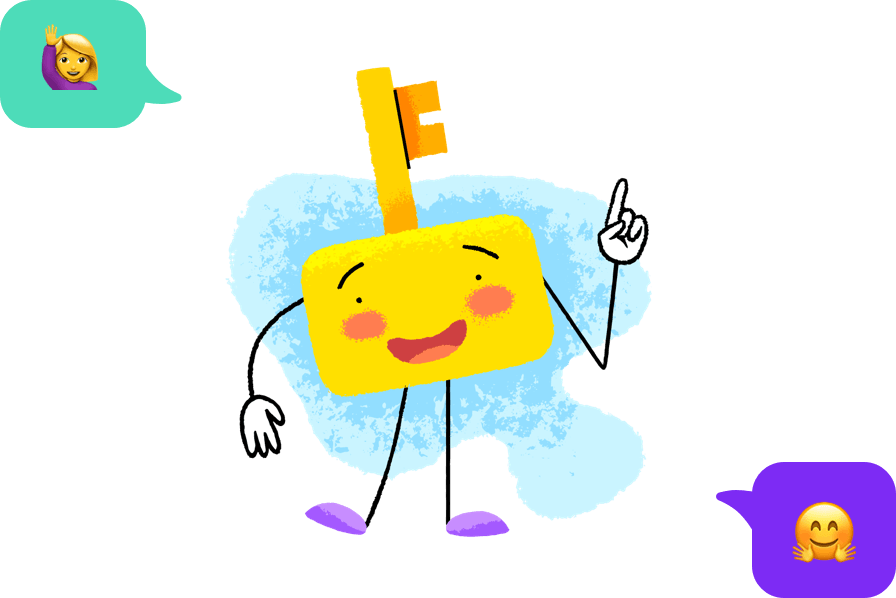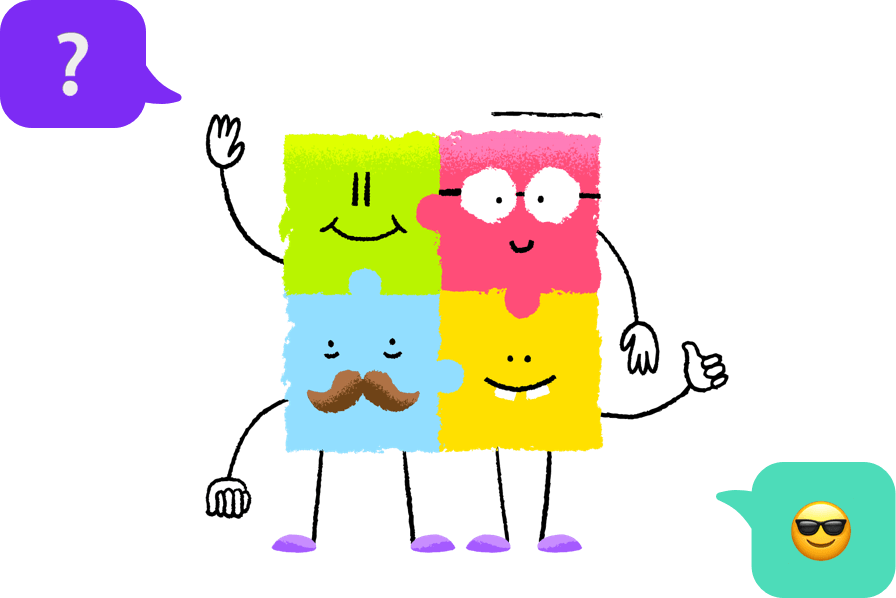How to say your name in German
You meet a group of people and don't know how to introduce yourself in German? And you want learn how to pronounce German correctly? We have solved your problem! Besides "Wie heißt du?" and ""Ich heiße ..." there are many others ways. But you do not always know when and how to introduce yourself in German and ask for the name? Our overview with interesting videos and sound recordings will help you to quickly understand the difference between formal and informal. In this way you will learn to introduce yourself. n addition, our free e-book provides you with all the information you need.

You meet a group of people and don't know how to introduce yourself in German? And you want learn how to pronounce German correctly? We have solved your problem! Besides "Wie heißt du?" and ""Ich heiße ..." there are many others ways. But you do not always know when and how to introduce yourself in German and ask for the name? Our overview with interesting videos and sound recordings will help you to quickly understand the difference between formal and informal. In this way you will learn to introduce yourself. n addition, our free e-book provides you with all the information you need.
Watch video: Asking for the name in German
To ask someone 'what is your name?' in German you would say: "Wie heißt du?" - the "wie" means 'how' - "heißt" comes from "heißen" - which means 'to be called'- and "du" you means 'you'- so it literally means 'how are you called': "Wie heißt du?" And there is a special letter which is called "ß" in German. Just remember for now it is pronounced like 'ss'. A valid answer to the question would be: "Ich heiße Anja." or "Ich bin Anja." - 'I am Anja'.
There is one more way to ask someone for their name: "Wer bist du?" - "Wer" means 'how' in German - do not confuese it with the english 'where'. "Wer bist du?" means: "Who are you?" "Wer bist du?" "Ich bin Anja."
We have one more way to ask for the name in German: We learnd "Wie heißt du?", "Wer bist du?" and the last one is "Wie ist dein Name?". "Wie" means 'how', "ist" 'is' is "dein" is 'your' and "Name" is 'name'. And you could say "Mein Name ist Anja" - 'My name is Anja'. This is a polity way Germans don't use often.
Examples Rules: How to say your name in German
Mein Name ist ... - My name is ...
The best way to start a small talk in German is often to ask about the well-being or the name. But how do you say what is your in German? You can ask: "Ich bin ..." Or “Mein Name ist ..." In German. The rules for addressing people in German tend to be stricter than many other cultures. Learning the following common rules will prevent you from being rude.


In German there are three particularly frequently used forms of introducing oneself. One of these is "Ich heiße ... ", which means "I am called..." You use it when you want to introduce yourself briefly and talk to a person in a dialogue.
- InformalInformal
- One personMultiple persons
Friendly
at school, at a party, meeting friends of friends


The form "Ich heiße Frau ..." is used as a formal form to introduce yourself as a woman. If you are a man you would use "Herr". The "Frau" and "Herr" are followed by the surname of the person introducing himself.
- FormalFormal
- One personMultiple persons
Friendly
at school, at a work party, at work


"Wir sind..." can be used to introduce a group of people or even different people. For example, "Wir sind die Klasse 8A." It is used in an informal context.
- InformalInformal
- Multiple personsOne person
Friendly
at school, at a party, at home


"Wir sind Frau und Herr ..." is used when, for example, two people check into a hotel, but only one person wants to introduce several people. After the "Wir sind ..." follow the last names of the persons. The person who speaks their name last.
- FormalFormal
- Multiple personsOne person
cool
at work, at a party, at a hotel


"Mein Name ist ..." is often used when you speak in front of a group of people and want to introduce yourself with your first name. An example is " "Hallo zusammen. Mein Name ist ...".
- InformalInformal
- One personMultiple persons
Friendly
at school, at a party, at a sports club


"Mein Name ist Frau..." is used when you speak in front of a group of people and want to introduce yourself as a woman with your surname. "Frau" is used just for women and "Herr" (Mein Name is Herr ...) for men. An example is: "Guten Tag. Mein Name ist Frau/Herr...".
- FormalFormal
- Multiple personsOne person
Friendly
Professional
at school, at work, at hotel


"Wir heißen ..." is used when a person wants to introduce several people. After "Wir heißen ..." follow the the first names of the persons. The person who speaks, says their name last and sometimes points their finger at the person they are introducing.
- InformalInformal
- Multiple personsOne person
Friendly
at school, at a party, at home


The presentation "Unsere Namen sind Frau und Herr..." is used in a formal context. After the "Frau (Mrs.)" and "Herr (Mr.)" follow the last names of the persons to be named.
- FormalFormal
- Multiple personsOne person
Professional
at work, at a party, at hotel/official guest-list


The formal self-presentation "Wir heißen Frau/Herr ..." is used to introduce different names of persons in a group. One example would be: "Wir heißen Frau Müller und Herr Winter". "Frau" is used for women and "Herr" for men. You can also use the first names: "Wir heißen Frau Vera Müller und Herr Tim Winter."
- FormalFormal
- Multiple personsOne person
Professional
at school, at a party, at a work meeting


The self-presentation "Unsere Namen sind ..." is used and different names of persons of a group are introduced into each other. One example would be: "Unsere Namen sind Marie und Max."
- InformalInformal
- Multiple personsOne person
Friendly
at work, at a party, holding a presentation


If you want to introduce yourself simply, you can just say "Ich bin..." and your name. You can also add your last name. In most parts of Germany, first name is said first and then the surname. In the south of Germany, however, it can also happen that the surname is said first and then the first name.
- InformalInformal
- One personMultiple persons
Friendly
at school, at a party, at home


If you want to introduce yourself formally as a woman, you can say "Ich bin Frau ..." and your last name. AS a man you use "Herr". This is often used by teachers in the first lesson. "Frau" is used for women and "Herr" for men.
- FormalFormal
- One personMultiple persons
Professional
at school, at a formal party, at work
Wie heißt ... ? - What is ...?
Do you know how to ask for the name in German? You can ask: "Wie heißt du?" Or “Wie ist dein Name?" In German. Here you find many more examples.


The question "Wie heißt du? is the most common in the German-speaking world.It is used among friends and in informal conversations. The word "wie" means "how", "heißt" comes from "heißen" and the word "du" means "you".
- InformalInformal
- One personOne person
Friendly
Curious
at school, at a birthday party


The question "Wie heißt ihr?" is the most common question to ask a group of people in the German-speaking world. It is used among friends and in informal conversations.
- InformalInformal
- Multiple personsMultiple persons
Friendly
Curious
at school, at a party, at home


The question "Wie heißen Sie?" is used in formal contexts. When you meet someone, you first greet them, for example, with a "Guten Tag".
- FormalFormal
- Multiple personsOne person
Professional
at school, at an official party, at work


"Wie ist dein Name?" is what you would ask on a guest list. Or, when you get to know someone new.
- InformalInformal
- One personOne person
Friendly
at school, at a party, at home


"Wie sind eure Namen?", you would ask in an informal context, when people are on a first-name basis with each other. You would also ask the question if you wanted to hack off a guest list at a disco.
- InformalInformal
- Multiple personsMultiple persons
Friendly
at school, at a party, at home


"Wie ist Ihr Name?" would be a question asked at a guest list when a formal meeting is involved. But you could also ask it when introducing yourself at a trade show or business dinner.
- FormalFormal
- One personOne person
Professional
Friendly
at school, at a party, at home


The question "Wer bist du?" is very direct and would rather be asked as a counter question. It seems polite to introduce a "Und wer bist du? before the question.
- InformalInformal
- One personOne person
Friendly
Curious
at school, at a party, at home


"Wer seid ihr?" is what you would informally ask a group of people. The question sounds inquiring, but can also be construed as suspicious.
- InformalInformal
- Multiple personsMultiple persons
Friendly
Curious
at school, at a party, at home


"Wer sind Sie?" is what you would informally ask a person. The question sounds inquiring, but can also be construed as suspicious.
- FormalFormal
- Multiple personsOne person
Professional
Friendly
at school, at a party, at home


"Wie sind Ihre Namen?", you would ask a group of people to introduce themselves. You'd also ask the question if you wanted to check into a hotel or check off a guest list.
- FormalFormal
- Multiple personsMultiple persons
Professional
Friendly
at school, at a party, at home
Practice German Dialogues
Dialogue #1 - To introduce oneself informally to someone
To start a conversation you can introduce yourself and then ask the other person for the name. In the same way, you can answer the question of what your name is, you’ll answer.
Dialogue #2 - Introduce yourself to a colleague
If you’re addressing one person formal way with "Sie" (you) — then you have one set of expressions. Asking a German-speaker for the name, the reply will be the last or family name, not the first name.
Free e-book: 10 most important conversations in German
It always depends on what setting you are in and on how you answer the question "Wie ist Ihr Name?". If you are in an informal environment, you can answer the question about your name with your first name. If you are in a more formal environment, introduce yourself using your last name. We have prepared an e-book for you for a more detailed and better insight into the most important conversations in German.
E-Book with Customisable Dialogues
10 Most Important Conversations in German

Share the knowledge with your friends:








You have a question? Leave a comment.